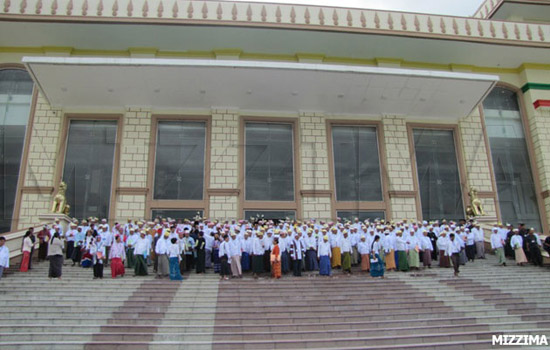Only government employees in remote, rural areas should get a salary increase, Finance and Revenue Minister Hla Tun told a joint session of the Burmese Parliament on Thursday.
 The minister came out in opposition to an earlier motion by Lower House Speaker Shwe Mann to give all government employees a raise as a way to encourage clean government and prevent corruption, according to MPs.
The minister came out in opposition to an earlier motion by Lower House Speaker Shwe Mann to give all government employees a raise as a way to encourage clean government and prevent corruption, according to MPs.
There are around 30,000 government employees in rural areas, MPs said.
“The minister is the one who has to pay, so he objected,” Kyi Myint, a Lower House MP from Latha Township told Mizzima. “He said the minister said he would consider raises for other employees in 2013-2014.”
On February 7, Shwe Mann’s motion was approved by the Lower House.
Because of the minister’s objection to the motion, it will be put to a vote in the Union Assembly (a joint Parliament session) or Shwe Mann may withdraw his motion, Kyi Myint said, according to Parliament procedures.
If the motion is put to vote, he said, it is likely to pass.
“He would not put it forward it without strong support. And the motion is one that should be approved. Many MPs may support it. I see a great chance,” he said.
Shwe Mann’s motion said, “Salaries and allowances of government employees must be raised at the beginning of the coming fiscal year in order that the employees can earn enough livelihood and in order to create clean and good governance.”
Talking about government employees and corruption, Shwe Mann told the assembly, he was sorry to learn that government employees across the country in almost all departments routinely take bribes and “tea money” and charge for normal services and documents because of low salaries.
On March 11, 2011, Minister Hla Tun told the Lower House, “The government would consider increasing salaries and pensions after calculating the inflation rate, and circulation of money in the country and GDP and the government will increase the salaries and pensions at a convenient time.”
Lower House MP Sai Maung Tin of the Laikha Township constituency asked what the ministry would do to reduce bribery.
In reply, Hla Tun said that only raising salaries of government employees would not be enough to fight bribery and corruption, and it would be necessary to educate employees, to take legal action against employees who are involved in corruption and to open relevant departments in which people can complain against corruption.
On February 7, talking about corruption, Shwe Mann told the Union Assembly, “Only when their stomach is full [they earn enough money for their livelihood], will they follow the rules. But when an employee’s stomach is full and the employee does not obey the rules, the employee will have a legal responsibility and he or she could be the subject of legal action.”
Salaries of government employees were increased in 1989, 1993, 2000, 2006 and 2009. In December 2009, the Finance and Revenue Ministry increased monthly salaries of government employees by 20,000 kyat (about US$ 29). Before that time, the minimum monthly salary of government employees was 20,000 kyat.
Moreover, on June 30, 2011, the government announced that pensions for retired government employees would be increased so that they would receive the same amount as when they were working. For political pensioners, if a present political pension exceeds 110,000 kyat, the pension rate will be their current salary, according to the pay scale.


